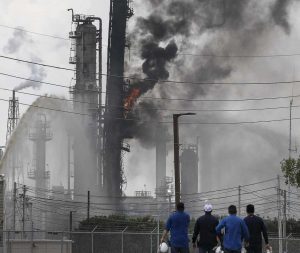
The state of Texas is suing Exxon Mobil for environmental violations, including releasing millions of gallons of firefighting wastewater into the Houston Ship Channel after the petrochemical giant’s most recent fire and explosion in Baytown.
The Houston Chronicle reports the lawsuit, filed by the attorney general on behalf of the Texas Commission on Environmental Quality, seeks injunctive relief, civil penalties exceeding $100,000, attorney’s fees and court costs for alleged violations of the Texas Clean Air Act and the Texas Water Code. It follows the filing of a lawsuit by Harris County on Aug. 1 — a day after the company’s plant erupted in flames and injured at least 37 people.
The July 31 fire at the Baytown Olefins Plant released a plume of black smoke visible for miles. For several hours, the City of Baytown issued an order to shelter in place to residents who live west of the plant and south of Texas State Highway Spur 330.
The cause of the fire still is being investigated. Two workers who suffered second- and third-degree burns as a result of the fire have also filed lawsuits seeking more than $1 million in damages each.
“The Baytown refinery has resumed normal operations, while the chemical and olefins plant remain at reduced rates,” she wrote.
“All employees and contractors involved have received medical evaluation and have been released. ExxonMobil remains focused on the safety of our people and those in the surrounding community and continues to fully cooperate with authorities regarding this incident,” she added.
Legal analysts say the state could be trying to wrest control of enforcement away from the Harris County, which has been more stringent on companies that violate environmental standards since Democrats took control of county government.
Exxon Mobil likely will try to get the cases consolidated in Travis County, where the attorney general’s case is filed, said Victor Flatt, an environmental law professor at University of Houston.
“This is the state most likely trying to assert its primacy to bring the case to take it away from Harris County and they could potentially seek softer penalties. I’m not sure if they will or not, but it’s possible,” Flatt said.
Rock Owens, managing attorney for the Harris County Attorney’s environmental section, which brought the case against Exxon, said it’s important that cases such as this remain in Harris County.
“These cases have a significant impact on our community, so they should be local cases, they should be heard by a Harris County judge and they need be tried, if need be, before a Harris County jury,” Owens said. “They don’t belong in Austin.”
The attorney general’s suit accuses the Exxon Mobil plant of unauthorized emissions after dozens of contaminants were released from the fire; unauthorized outdoor burning; unauthorized visible emissions from the dark plume of smoke created by the fire; and creating a nuisance from air contaminants and smoke.
The suit also accuses the plant of violating the water code after water pumps used to move the firefighting wastewater from a retention pond to the refinery’s treatment plant became overwhelmed.
Over the next two days, nearly 20 million gallons of firefighting wastewater combined with stormwater went from the retention ponds into an adjacent canal that flows into West Fork Goose Creek, then Goose Creek, and eventually Tabbs Bay in the Houston Ship Channel, according to the attorney general’s petition.
Each violation of the state water code could amount to penalties of up to $25,000 per a day. That could mean Exxon Mobil faces up to $375,000 in penalties, not including the cost of any plant upgrades that could be required, said Adrian Shelley, director of the Texas office of Public Citizen, the nonprofit consumer advocacy group.
But the fines could turn out to be much greater if the state instead decides to treat the release of each individual pollutant as its own separate violation — instead of just penalizing the company for the single event, Shelley noted.
Exxon Mobil’s initial reports submitted to the state estimates that the fire triggered the release of dozens of air contaminants including butene, benzene, butadiene and carbon monoxide.
It was the second fire this year at an Exxon Mobil facility in Baytown. Harris County also sued Exxon in May for alleged violations at another Baytown plant after a March 16 fire in which toxic pollutants were leaked into the air for eight days.
“Harris County has been aggressive about filing these prayers for injunctive relief very quickly. Seeing Attorney General Paxton regularly filing suit on that same quick timeline is somewhat of a new development,” said Shelley. “The signal of the early suit is good, and we hope that it portends to real corrective action from the AG in collaboration with the county and other local entities.”
Luke Metzger, executive director of the Environment Texas, the Austin-based environmental watchdog group, said he “cautiously welcomed” the AG’s suit but noted that local governments and citizens’ nonprofits have historically produced stronger records of enforcement.
“There is also precedent for polluters to run to the state seeking a sweetheart deal to avoid real accountability, and we hope that is not what is happening here. We are counting on Attorney General Paxton to use real force to seek a massive penalty and a binding commitment from Exxon Mobil to stop illegal pollution releases that put people’s health and safety at risk,” Metzger said.






